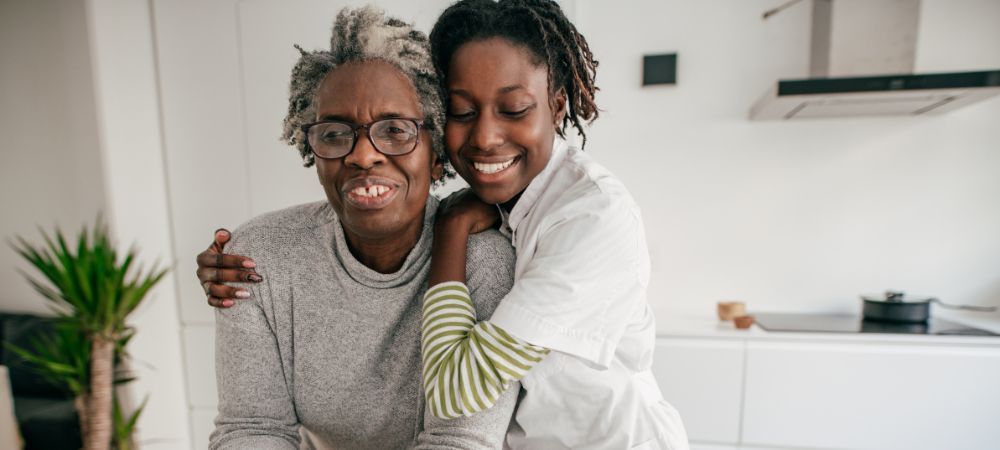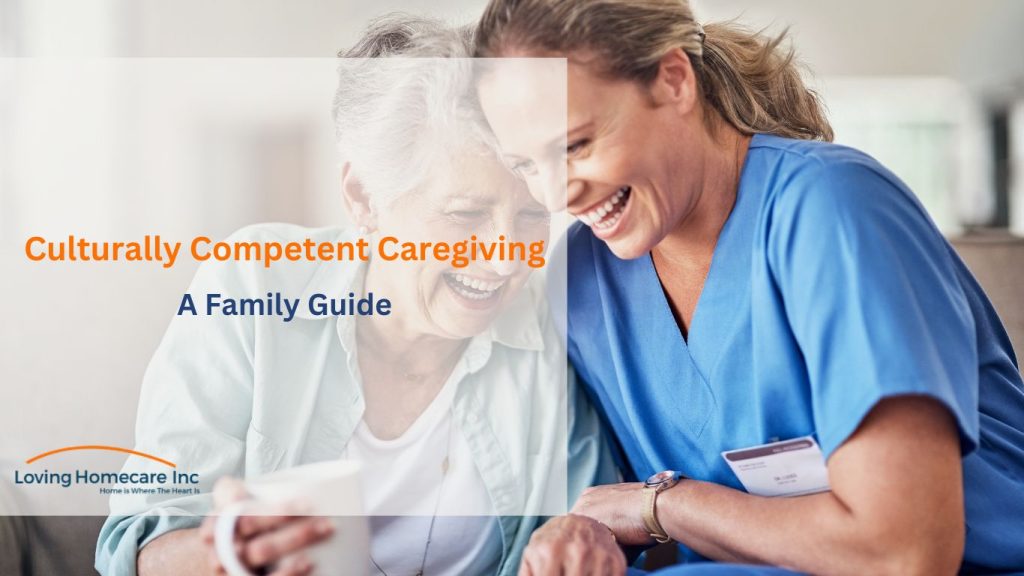Recently updated on February 17th, 2025 at 11:50 am
30 Seconds Summary
- Culturally competent caregiving, also sometimes known as culturally appropriate care, is about being sensitive to the cultural identity and heritage of various individuals.
- Seniors often feel more secure and emotionally supported when caregivers provide culturally competent care and acknowledge their traditions, religious beliefs, and preferred communication styles.
- Home care agencies should provide cultural competency training to make sure their caregivers understand various backgrounds and needs.
When you entrust your loved one’s care to a caregiver, you often wonder if that person understands their traditions, language, and deeply held values. Moreover, you may be concerned if your loved one feels comfortable and respected. This is where culturally competent caregiving comes in; it makes sure that seniors receive care that fits their cultural background, beliefs, and personal preferences.
As our world becomes increasingly diverse, the importance of culture in caregiving cannot be denied. Language barriers and traditional healing practices have a huge impact on how you experience care and whether you feel safe, heard, and valued.
In this guide, we will look at what culturally competent care is, why it matters, and how families can find caregivers who provide compassionate care and inclusive support.
Understanding Culturally Competent Caregiving

Culturally competent caregiving, also sometimes known as culturally appropriate care, is about being sensitive to the cultural identity and heritage of various individuals.
It is important to note that a person’s identity depends on several aspects, including ethnicity, nationality, and religion. This does not stop there; many other aspects and cultural preferences can influence a person’s identity.
What Does Cultural Competence Mean in Caregiving?
So now, what is culturally competent caregiving? Cultural competence in caregiving means that the caregiver understands and respects the cultural backgrounds, traditions, and preferences of seniors receiving care.
How Does Culture Affect Seniors in Home Care?
The importance of culture in caregiving cannot be overstated. Seniors often feel more secure and emotionally supported when caregivers provide culturally competent care and acknowledge their traditions, religious beliefs, and preferred communication styles. This will not only improve their feelings of well-being but also reduce their feelings of isolation.
The Role of Culture in Senior Care
Cultural awareness in healthcare plays a very important role; it not only shapes the caregiving approach but also has a major impact on the relationship between the caregiver and the senior. Here is how:
How do Cultural Values Shape Caregiving Approaches?
There are several cultural considerations in senior care. It significantly influences how families view aging, healthcare, and support systems. For example:
- In Asian cultures, care is usually family-centered, and elders are deeply respected.
- On the other hand, Hispanic families prioritize multigenerational caregiving and communal support.
- Moreover, Middle Eastern seniors often have specific dietary and religious practices that must be respected.
Impact of Language Barriers on Caregiver-Senior Relationships
Language barriers in senior care can cause misunderstandings, often leading to frustration or inadequate support. The language barrier often contributes to poorer patient assessment, misdiagnosis, and delayed treatment. Moreover, it can also cause an incomplete understanding of the patient’s condition and prescribed treatment, impairing confidence in services received.
To overcome this language barrier, it is often recommended that bilingual caregivers be hired. These caregivers can help bridge communication gaps and improve care quality.
Need a bilingual caregiver? See our Caregiver Hiring Guide
Traditional vs. Modern Caregiving Approaches
Traditional caregiving usually relied on family members providing care at home, most of the time with limited medical expertise, as older generations often prefer traditional home remedies. On the other hand, modern caregiving usually relies on professional caregivers and modern medical practices. The support you get due to modern care is more structured based on specialized medical knowledge. Moreover, the focus is on an individual’s specific needs and maintaining quality of life.
Culturally aware home caregivers find a balance that honors seniors’ preferences while ensuring their safety and well-being.
Understanding caregiver duties and responsibilities is important to ensure your loved one receives the quality care they deserve. Look at the guide from Loving Homecare to learn what to expect from a professional caregiver and how they can provide the support your loved ones need.
Best Practices for Culturally Competent Caregiving

When providing culturally competent care, here are a few practices you should adhere to:
RespectingTraditions & Customs
Caregivers should respect the traditions and customs of the family. It can be done by:
- Asking about the senior’s cultural preferences.
- Learning basic phrases in their preferred language.
- Incorporating culturally significant foods and activities into daily care.
Training Caregivers to Be Culturally Sensitive
How to provide culturally competent care?Home care agencies should provide cultural competency training to make sure their caregivers understand various backgrounds and needs. This means that the caregivers should be educated and made aware of different cultures, customs, and beliefs. This would help the caregivers to adapt to the changing needs of every individual.
Creating Personalized Caregiving Plans
Here is how personalized caregiving plans can be developed:
- Assess their specific needs.
- Caregivers should also collaborate with family members to incorporate traditions into care routines.
- Communication and caregiving styles should also be adjusted according to cultural norms.
Caregiving is a very rewarding task, but it can become overwhelming really quickly. Have a look at our guide to figure out the symptoms, causes, and coping techniques for Caregiver Burnout.
Examples of Culturally Competent Caregiving
Hispanic Senior Caregiving in Whittier, CA
Many Hispanic seniors in Whittier, CA, feel more comfortable with caregivers who speak Spanish and understand their traditions. Hispanic senior caregiving in Whittier, CA, is often based on preparing familiar meals, respecting religious beliefs, and strengthening family connections.
For example, a Spanish-speaking caregiver might cook traditional meals and support religious practices like attending church. Family is very important in Hispanic culture, so caregivers may also help seniors stay connected by arranging family visits to make sure they feel loved and supported.
Other Cultural Caregiving Examples
This culturally competent caregiving is not only limited to Hispanic communities. Asian-American seniors often prefer family-centered care, where respect for elders is absolutely necessary.
Similarly, Middle Eastern seniors often opt for caregivers who respect prayer times and dietary rules, like halal food.
Likewise, African-American seniors require caregivers who acknowledge historical experiences and community support systems.
Essential Components of Cultural Competence in Caregiving
Here are some of the essential components of culturally competent caregiving:
- Cultural Awareness
The caregiver should understand different cultures and beliefs.
- Cultural Knowledge
Caregivers should also try to learn specific facts about a person’s culture.
- Cultural Sensitivity
They should also respect and value cultural differences.
- Effective Communication
Cultural competence would also bridge language and cultural gaps.
- Adaptability
Caregivers should also adjust care practices to meet cultural needs.
- Continuous Learning
Caregivers should always remainopen to learning new cultural insights and practices.
Benefits of Cultural Competence in Caregiving
Here are some of the main benefits of cultural competence in caregiving:
- Builds Trust
Seniors feel safe and comfortable with caregivers who understand their culture.
- Better Health
Care that respects cultural beliefs leads to better physical and mental well-being.
- Easier Communication
The chances of misunderstandings are reduced with caregivers who understand the language and traditions.
- Stronger Family Support
Families stay more involved when their traditions are respected.
- Happier Seniors
Personalized care makes seniors feel valued and improves their overall experience.
What is the Similarity between Patient-Centered Care & Cultural Competence?
The focus of both patient-centered and culturally competent care is on treating each patient as an individual with unique needs. Both approaches provide respectful and personalized healthcare that improves the experience of a patient.
Here are some of the similarities between patient-centered care and cultural competence:
- Patient First
Both put the patient at the center of care and value their choices and concerns.
- Personalized Care
Care plans are personalized to fit individual needs.
- Trust and Communication
Both approaches build good relationships through listening and clear communication.
- Cultural Awareness
Both of the approaches respect personal and cultural differences that have an impact on health.
However, the main difference is that patient-centered care considers the whole person, while cultural competence focuses on how culture affects healthcare.
How to Find a Culturally Competent Caregiver
Looking for a culturally competent caregiver can be difficult, but here are some things that you should consider while you are choosing a caregiver for yourself or your loved one:
- Ask if they have previous experience caring for individuals from this cultural background.
- Ask if they are fluent in your preferred language.
- Ask how they incorporate cultural awareness in healthcare practices.
So, where can you find culturally aware caregivers? Here is a good start:
- Consider getting in touch with a homecare agency that specializes in diverse caregiving.
- You can also get in touch with community centers that connect families with caregivers from similar cultural backgrounds.
For compassionate, culturally competent caregiving, visit Loving Homecare today.
Over to You
Cultural competency is necessary when it comes to caregiving. It has many benefits for the individual and families and makes sure that the individual feels comfortable, understood, and supported.
Looking for a compassionate caregiver? Visit Loving Homecare today!
Learn more about our In-Home Senior Care Services here!

